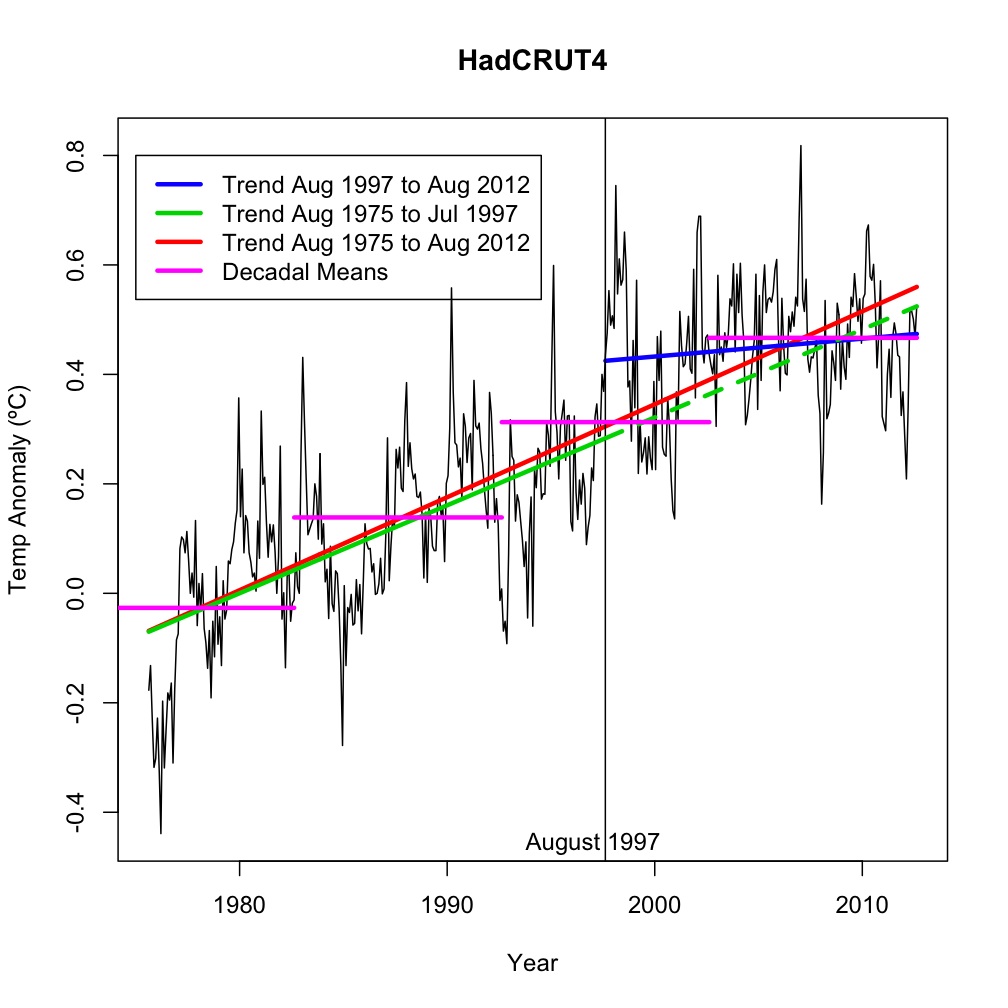Oldie but goldie:
Quite a lot of that "pause" and "accelerated warming to 1998" simply comes down to that one extreme El-Nino. And if you look at a longer timescale, as befitting a climatological perspective, there isn't much of a "pause", but rather some excursions above and below a long-term trend of ~ 0.15 ... 0.2 °C per decade.
(
http://www.realclimate.org/index.php/archives/2012/11/short-term-trends-another-proxy-fight/)
Cool! I knew the reason 1998 is always chosen as the start year for the warming "pause" is that its extreme El Niño caused a large temperature spike, but I was under the impression that at least some of the leveling off wasn't attributable to just ENSO, volcanic aerosols, and the solar cycle alone. I had read that deep ocean heat uptake (700-2000 m) was likely where the remaining extra heat had gone based on recent measurements that finally do now cover enough of the deep ocean to know about its warming trend. The IPCC listed that as "likely" in the ocean section of AR5; I suppose I could poke around more on Google Scholar to see how much is known in detail.
CavLancer said:
I think the whole silly thing will come to an end with the current El Nino. Temps have dropped slightly in the last decade and a half and when the only thing keeping them up somewhat is done then the drop really starts getting going in a serious manner. Keep in mind this "pause" has occurred while CO2 has climbed off the graph. So much for correlation...
First of all, temperatures haven't dropped, they've just risen more slowly than they did in the 1970-1998 period. The majority of that appears to be due to ENSO and the current weak solar cycle.
You seem to be under the impression that we're in imminent risk of falling into another glacial period, were it not for our CO2 emissions. That is something that was considered likely by some scientists in the 1970s and 1980s as paleoclimatology was taking off and the causes and frequencies of the last glacial periods were determined. We now know that to be unlikely for at least the next 50,000 years due mostly to the fact that the eccentricity cycle is in its lowest (and still decreasing) phase. Ice ages appear to start when the subarctic regions do not become warm enough in summer to melt the previous winter's snow and an ice sheet develops in the high latitudes of the Northern Hemisphere.
In fact, summer solar insolation near the Arctic Circle is near a local minimum and will increase again for several thousand years, fall back to slightly above its current value, and then rise again. Here's a graph of the fluctuations of summer insolation at 65 N due to the combined effect of all the
Milankovitch cycles (red line).
The graph is from Wikipedia, which took it from
this Science paper. Minima correspond well to the initiation of glacial cycles. Interglacials tend to start shortly after maxima, which cause enough solar energy to hit high latitudes that rapid melting of ice sheets occurs. The current interglacial appears to have begun due to the spike you can see at 10-20 thousand years ago. We're currently in a very shallow minimum insufficient to cause glacial conditions outside Greenland and Antarctica, and the next minimum below the present value does not occur until ~55,000 years from present.
In short, this would "normally" be an unusually long interglacial anyway, with glacial conditions not returning for at least the next several tens of thousands of years. The entire article on Milankovitch cycles is worth a read.







